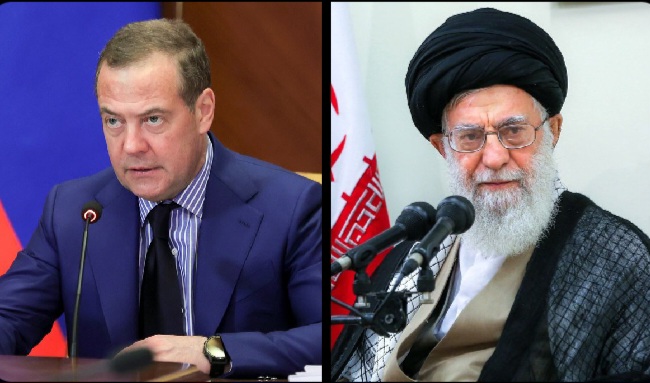By Abdullahi Inuwa
In a bombshell statement that has sent ripples across diplomatic and defense circles worldwide, former Russian President Dmitry Medvedev has claimed that “a number of countries are ready to directly supply Ir@n with their own nuclear warheads.”
The controversial assertion, made during a hard-hitting interview on Russian state television, has raised alarm over the growing volatility of global nuclear dynamics and deepened fears about a new phase of escalation in the Middle East.
Medvedev, now the Deputy Chairman of Russia’s Security Council and a key voice in Moscow’s increasingly hawkish rhetoric, did not specify which countries he was referring to, but hinted that the motivation stems from the perceived hypocrisy of Western powers.
“If the United States and its allies can provide unlimited weapons and support to Ukraine and Isr@el,” Medvedev said, “then no one should be surprised if others are now prepared to give Iran the same kind of ‘strategic support’—even if it means transferring nuclear warheads.”
Security analysts say the claim—though unverified—could signal a dangerous new phase in global arms competition. The very idea that nuclear warheads might be shared between sovereign nations—especially with a country like Ir@n, long under international scrutiny for its nuclear ambitions—has raised red flags in Washington, Brussels, and Tel Aviv.
“If true, this would shatter every non-proliferation agreement and undo decades of diplomatic progress,” said Dr. Rachel Klein, a senior fellow at the International Institute for Strategic Studies. “It would push the Middle East toward an irreversible tipping point.”
Tehran has yet to comment on Medvedev’s remarks, but the Islamic Republic has long maintained that its nuclear program is peaceful and that it has no intention of building nuclear weapons. However, recent moves to expand uranium enrichment have drawn criticism from the International Atomic Energy Agency (IAEA) and triggered renewed sanctions from the West.
Isr@eli officials have previously warned that a nuclear-armed Iran would cross a “red line,” and have not ruled out preemptive military action if Tehran comes close to weaponizing its nuclear program.
The United States State Department, in a swift response, dismissed Medvedev’s comments as “reckless provocation” and accused Moscow of “fanning the flames of global instability.”
NATO Secretary-General Jens Stoltenberg called the statement “deeply irresponsible,” warning that any attempt to transfer nuclear warheads to Iran would constitute “a severe breach of international law and trigger immediate consequences.”
Meanwhile, China and India, both nuclear powers and key players in the BRICS alliance, have refrained from comment—though Beijing reiterated its commitment to nuclear non-proliferation.
Some experts suggest that Medvedev’s statement might be more political theater than a policy preview, aimed at warning the West against further entanglement in Ukraine and the Middle East.
“This is classic brinkmanship,” said Dmitri Kuznetsov, a Russian foreign policy analyst. “It’s not about what’s happening now, but about what could happen if the West continues to isolate Russia and Iran.”
Still, in an era of rapidly eroding global trust and surging geopolitical alliances, even a bluff can become dangerously real.
As nuclear tensions rise and the rules-based global order teeters, Medvedev’s chilling words may not just be rhetoric—they could be a preview of the next global crisis.




